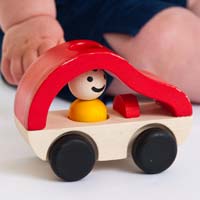Preparing Kids For A Hospital Stay

Coping with kids' pain after surgery
"The problem is that when an adult undergoes surgery, they can vocalize their concerns once they're awake and tell someone that it hurts, whereas a three-month-old can't do that," says Dr. Roy. For years it was believed that infants didn't experience pain because their neurological systems weren't fully developed, but that is now known to be a myth, he says. Signs of pain in infants and small children include decreased movement, grimacing, irritability and crying.
Dealing with pain: "We assume a child will have pain and so we're very aggressive when it comes to treating it," says Dr. Roy. Patients who are exposed to substantial pain may have delayed healing, need to stay in hospital longer or may be more predisposed to infection. "There is lot of suggestion that by dealing with pain aggressively, the patient benefits. The goal is to have pain well managed for when the child wakes, so that they may feel no pain or discomfort at all." This is usually accomplished with a combination of pain management techniques, including medications such as rectal Tylenol and local anesthesia, such as freezing an incision.
Understanding your role: Although you'll likely have one-on-one nursing in the recovery room when your child first wakes up, parents also play an important role in the recovery process. "It helps to have the parents there all the time using diversion, toys, comfort–all of those things are key," says Dr. Roy. How long your child spends in the recovery room may depend on his size. Children under six kilograms may remain in the recovery room for at least four hours, while those over six kilograms could be discharged to the ward within an hour of waking up.
As your child recovers from surgery, your main role is to comfort them and be their advocate. "Parents should feel empowered to ask questions," says Dr. Roy. If you feel your questions aren't being answered or if you have any concerns, most children's hospitals have a patient representative you can talk to, while others even have a hotline you can access just by picking up the phone in your child's room. Asking questions and getting help will ensure your child is getting the best care possible.
Finally, if your child is staying in the hospital overnight, you can stay with them on a built-in, foldout bed. Having familiar things on hand, such as favorite toys, books or blankets can help make overnight stays easier for your child.
Meet our expert:
Dr. Lawrence Roy is a pediatric anesthesiologist at the Hospital for Sick Children in Toronto where he has spent the last eleven years as Chief of the Department of Anesthesia. Dr. Roy sponsored the development of the Divisional Centre of Pain Management and Pain Research and continues to champion the development of the Centre of Excellence for Pain Management and Research at SickKids. He served as Chair of Section on Pediatric Anesthesia, was a former president of the Canadian Pediatric Anesthesia Society and is a Clinical Teacher at the University of Toronto.

